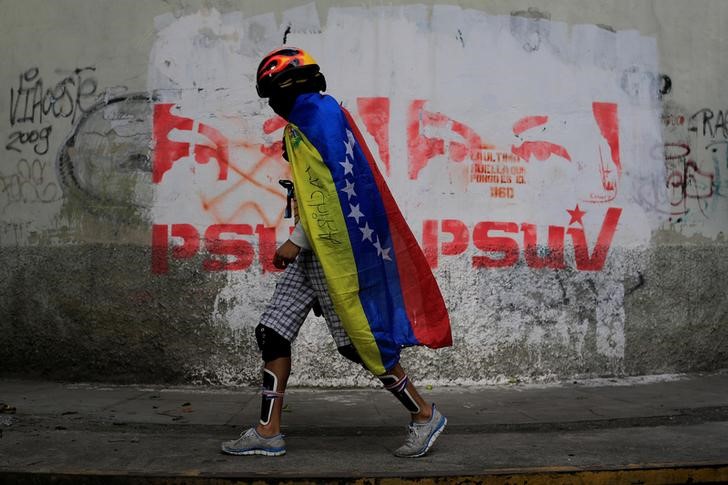
By Andrew Cawthorne and Girish Gupta
CARACAS (Reuters) – Many Venezuelan streets were barricaded and deserted on Thursday for a strike called by foes of President Nicolas Maduro to demand elections and the scrapping of plans for a new congress they fear would consolidate dictatorship in the OPEC country.
From the Andes to the Amazon, millions joined the 24-hour shutdown, staying at home, closing businesses or manning roadblocks in a civil disobedience campaign the opposition hopes will end nearly two decades of socialist rule. Two young men died in the unrest, authorities said.
“We must all do our best to get rid of this tyrant,” said Miguel Lopez, 17, holding a homemade shield emblazoned with “No To Dictatorship!” at a barrier on a Caracas street devoid of traffic.
Many private transportation groups heeded the strike call, while students, neighbors and activists hauled rubbish and furniture into streets to erect makeshift barriers. The opposition said 85 percent of the country joined the strike.
In some places, however, such as the poor Catia and January 23rd neighborhoods of Caracas, streets and shops were still buzzing, while motorbike taxis replaced buses.
“I have to work to subsist, but if I could, I would strike,” said clothes seller Victor Sanabria, 49, in the southern town of San Felix. “We’re tired of this government.”
In a speech, Maduro vowed some of the strike leaders would be jailed and insisted the action was minimal, with the 700 leading food businesses, for example, still working.
He said opposition supporters attacked the headquarters of state TV and burned a kiosk of the government postal service, but were repelled by workers and soldiers. “I’ve ordered the capture of all the fascist terrorists,” he said, singling out a Caracas district mayor, Carlos Ocariz, for blame.
In clashes elsewhere, security forces fired tear gas at protesters manning barricades. Youths shot fireworks at them from homemade mortars.
Ronney Tejera, 24, and Andres Uzcategui, 23, died after being shot during protests, the state prosecutor’s office said. More than 170 people were arrested by late afternoon, a local rights group said.
DEATHS
Violence during four months of anti-government unrest has taken around 100 lives, injured thousands, left hundreds in jail and further damaged an economy in its fourth year of a debilitating decline.
Clashes have occurred daily since the opposition Democratic Unity coalition and a self-styled youth-led “Resistance” movement took to the streets in April. In the latest fatality, a man confronting protesters was burned to death this week in the northern coastal town of Lecheria, media and authorities said.
Leaders of Venezuela’s 2.8 million public employees said state businesses and ministries remained open on Thursday.
“I’m on strike ‘in my heart’ because if we don’t turn up, they will fire us,” said a 51-year-old engineer heading to work at state steel plant Sidor in southern Bolivar state.
Oil company PDVSA, which brings in 95 percent of Venezuela’s export revenue, was not affected.
In an internal memo seen by Reuters, PDVSA ordered “all workers to strictly comply with working hours” and stressed that failure to show up would lead to “sanctions.”
“The Constituent Assembly is going ahead!” PDVSA president Eulogio Del Pino said on state TV, referring to Maduro’s plan to create a super-legislature in a July 30 vote to replace the current opposition-controlled National Assembly.
As the PDVSA president spoke he was surrounded by red-shirted oil workers in Monagas state chanting “they will not return” in reference to opposition aspirations to take power.
Some Venezuelans grumbled that Thursday’s strike would cost them money at a time of extreme hardship.
“How can I eat if I don’t work?” said Jose Ramon, 50, chopping bananas and melons at his stall in a market in Catia.
By early evening, the strike seemed far more successful for the opposition than a similar action last year, which had a lukewarm response after Maduro vowed to seize closed businesses.
“The streets are desolate, including close to the dictator,” said opposition leader Freddy Guevara, tweeting pictures of empty avenues including near the Miraflores presidential palace.
“We fill and empty the streets when we choose in protest.”
“SANCTION ME”
Venezuela’s opposition now has majority support and said it drew 7.5 million people over the weekend for a symbolic referendum against the proposed assembly, which 98 percent of voters rejected.
Maduro also faces widespread foreign pressure to abort the assembly, which could rewrite the constitution and supersede other institutions.
The opposition is boycotting the vote, whose rules seem designed to guarantee a government majority in the new congress.
U.S. President Donald Trump weighed in on the dispute this week, threatening economic sanctions if the July 30 vote goes ahead. Individual sanctions could be applied to Maduro allies such as Defense Minister Vladimir Padrino or Socialist Party No. 2 Diosdado Cabello, U.S. officials have told Reuters.
“If they don’t sanction me, I would feel bad!” mocked Cabello at a rally of supporters on Thursday.
As well as a presidential election, Venezuela’s opposition is also demanding freedom for more than 400 jailed activists, autonomy for the legislature and foreign humanitarian aid.
(Additional reporting by Andreina Aponte, Diego Ore, Corina Pons, and Alexandra Ulmer in Caracas, Franciso Aguilar in Barinas, Anggy Polanco in San Cristobal, Maria Ramirez in Ciudad Guayana, Isaac Urrutia in Maracaibo, Mircely Guanipa in Punto Fijo; Editing by Tom Brown, Toni Reinhold)















